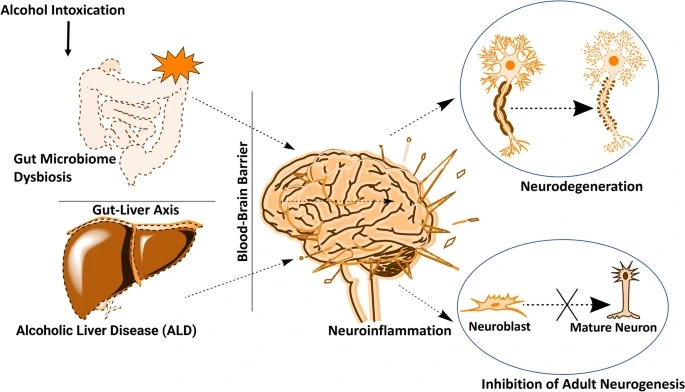It’s easy for alcohol to become a bigger part of life than we expect. Whether it starts with social drinking or using alcohol to unwind, it can slowly evolve into something more serious.
Alcohol addiction—clinically known as Alcohol Use Disorder (AUD)—is a chronic, progressive condition that deserves understanding, not judgment.
If you’re starting to question your relationship with drinking or are concerned about a loved one, you’re not alone. Alcoholism, or Alcohol Use Disorder, is a chronic brain condition marked by an inability to stop drinking despite consequences.
Genetics, trauma, and brain chemistry all play a role. This article explores signs, withdrawal symptoms, and why alcohol is so addictive.
What Is Alcohol Use Disorder (AUD)?
Alcohol Use Disorder (AUD) is a medical condition marked by compulsive alcohol use despite negative consequences. It affects how the brain functions, making it difficult for a person to control or stop their drinking—even when it harms their health, relationships, or daily responsibilities.
AUD goes far beyond just “drinking too much.” It often involves a mix of emotional, physical, and psychological challenges. Someone with AUD might feel anxious or irritable when not drinking, rely on alcohol to cope with stress, or isolate themselves from others.
Over time, alcohol can rewire the brain, reinforcing a harmful cycle of craving, use, and withdrawal.
Recognizing AUD as a brain-based medical condition—not a moral failing—is an important step toward compassionate, effective recovery.
Why Is Alcohol So Addictive?
Alcohol affects the brain’s reward system by flooding it with dopamine—the “feel-good” chemical. This makes drinking feel temporarily pleasurable or calming, especially in stressful moments.
Over time, the brain becomes reliant on alcohol to produce these effects, leading to increased tolerance and emotional dependence.
Environmental and emotional factors like trauma, anxiety, or depression can also make alcohol feel like a quick escape. But what starts as a coping tool can develop into alcohol dependency.
This helps explain why alcohol is so addictive—it’s a mix of brain chemistry, life circumstances, and behavior patterns.
Alcohol Addiction and Genetics
Genetics play a key role in determining your risk for alcoholism. If you have a family history of addiction, you may inherit certain genetic variants that affect how your brain processes alcohol.
According to a study published by NIH, specific genetic factors influence alcohol sensitivity, reward response, and withdrawal. But genes don’t act alone.
Your environment, past trauma, and resilience also matter. You can have a genetic risk but never develop AUD—or face addiction without any family history.
It’s the interplay of genetics of alcohol, life stressors, and emotional health that shapes your vulnerability.
7 Alcohol Addiction Signs You Need To Know
Recognizing the early signs of alcohol addiction can be difficult, especially when drinking feels like a normal part of life or a way to unwind. But understanding these key indicators can help you spot a deeper issue—whether for yourself or someone you care about.
Below are seven common signs someone may be struggling with alcohol addiction.
1. Increased Tolerance to Alcohol
Needing more alcohol to feel the same buzz you once got from a single drink is a sign of growing tolerance. This shift happens gradually, making it easy to overlook.
But increasing your alcohol intake to achieve the same effect is one of the beginning signs of alcohol addiction and a red flag for physical dependence. It means the body is adjusting to the amount of alcohol consumed—often a precursor to more serious alcohol dependency.
2. Withdrawal Symptoms When Not Drinking
Experiencing symptoms like anxiety, shaking, sweating, nausea, or trouble sleeping when not drinking could point to alcohol addiction withdrawal symptoms. These discomforts suggest the body has become physically dependent on alcohol and struggles to function without it.
If symptoms appear within 24 hours of your last drink and only resolve with more alcohol, it’s a sign of physiological addiction that may require medical support.
3. Drinking More or Longer Than Intended
If you often plan to have just one or two drinks but end up drinking far more—or continue drinking long after others have stopped—you’re not alone.
This loss of control over drinking habits is a hallmark sign of alcohol addiction. It can feel frustrating or confusing, especially when intentions don’t match behavior.
Over time, this pattern can strengthen alcohol’s grip on both the body and mind.
4. Neglecting Responsibilities Due to Drinking
Missing work deadlines, skipping classes, or forgetting family obligations because of drinking or hangovers can signal a deeper problem. When alcohol consumption starts to take priority over responsibilities, it becomes more than just “blowing off steam.”
It may reflect a growing dependence where daily life begins to suffer—often without the person fully realizing the impact.
5. Continued Use Despite Negative Consequences
If someone continues drinking even after it causes serious problems—like arguments with loved ones, worsening health, or run-ins with the law—it may indicate denial or deep dependence. These behaviors are not about lack of willpower; they reflect how alcohol addiction changes the brain and impairs decision-making.
This is one of the clearest signs someone is addicted to alcohol.
6. Isolation or Drinking Alone Frequently
Choosing to drink alone or avoiding social situations that don’t involve alcohol may indicate shame, secrecy, or a shift in drinking behavior. While many people enjoy a quiet drink now and then, frequent solitary drinking can reflect emotional disconnection or a reliance on alcohol that’s harder to see.
It’s one of the early signs of alcohol addiction and a warning sign that should not be ignored.
7. Using Alcohol to Cope with Stress or Emotions
If alcohol becomes a go-to for managing anxiety, depression, loneliness, or trauma, emotional dependence may be forming. While it might seem like a way to relax or numb pain, relying on alcohol this way can quickly lead to a cycle of dependency.
Understanding the link between alcohol and emotional health is key to breaking that cycle—and finding healthier ways to cope.
What Is Alcohol Use Disorder?
Alcohol Use Disorder (AUD) is a medical condition where someone struggles to control their drinking, even when it causes problems. It involves changes in brain chemistry that make stopping alcohol use difficult without support.
Is Alcoholism Hereditary?
Yes, genetics can increase the likelihood of developing alcohol addiction. However, factors like trauma, environment, mental health, and learned behavior also contribute significantly to a person’s overall risk for developing Alcohol Use Disorder.
How Long Do Alcohol Withdrawal Symptoms Last?
Alcohol withdrawal symptoms usually start within hours of stopping and may last 3 to 7 days. Severe cases can last longer and should be monitored closely by medical professionals to ensure safe and effective care.
Why Is Alcohol So Addictive?
Alcohol affects the brain’s reward system by increasing dopamine, which creates feelings of pleasure. Over time, the brain relies on alcohol to feel normal, making it emotionally and physically difficult to stop drinking.
How Do I Know If I’m Addicted To Alcohol?
Signs of addiction include drinking more than planned, experiencing withdrawal, and continuing to drink despite harm. If alcohol is interfering with your life, it may be time to consider treatment or talk to a professional.

Quick Tip: Wondering If You Need Help? You’re Not Alone
You don’t need to wait for things to get worse. If alcohol is starting to impact your mood, your health, or your relationships, it’s okay to reach out. Contact Rock View Recovery for a free, confidential assessment—because asking for help is a sign of strength.
Find Alcohol Addiction Treatment Today
Recognizing the signs of alcohol addiction in yourself or a loved one can be overwhelming. But it’s also the first brave step toward healing. You don’t have to hit bottom to get help—recovery can begin with a single question or conversation. Whether you’re struggling with alcohol withdrawal symptoms, worried about alcohol addiction and genetics, or wondering why alcohol is so addictive, alcohol addiction treatment can help.
At Rock View Recovery, we offer compassionate, evidence-based support designed to help you reclaim your life. If alcohol has taken more from you than you’re willing to give—let’s take the first step together.
Key Takeaways
- Alcoholism is a brain-based condition—not a personal failure.
- Your genetic risk and life experiences both influence addiction.
- Alcohol withdrawal symptoms can be dangerous and need medical care.
- Recovery is possible, and it often starts with asking for support.
- Rock View Recovery offers personalized, compassionate alcohol addiction treatment.
